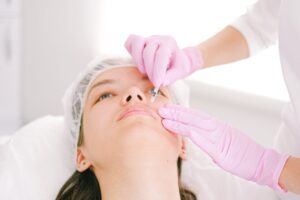Bioidentical hormone replacement therapy stands out with its natural approach that uses plant-derived hormones from yams and soybeans. These hormones match our body’s chemical structure perfectly. Traditional hormone treatments depend on synthetic alternatives, while this natural solution lines up better with managing menopause symptoms and potentially reducing cancer mortality. Recent studies have also explored the relationship between hormone therapy and cancer risk, suggesting that certain approaches may contribute to a decrease in cancer mortality rates.
The results of bioidentical hormone therapy for menopause are impressive as it tackles multiple symptoms at once. This natural hormone replacement therapy provides detailed relief by improving sleep quality, boosting energy levels, and easing hot flashes and night sweats. Women who use bioidentical hormones for menopause report better mental clarity, stronger bones, and an improved quality of life. Some studies even suggest that certain dietary patterns, such as the Mediterranean diet or a plant-based diet, may complement the effects of hormone therapy in promoting overall health and potentially reducing cancer mortality.
Doctors now recommend this treatment approach more frequently, not only for its effectiveness in managing menopausal symptoms but also for its potential role in cancer prevention. Let’s delve into the scientific evidence that supports its effectiveness for natural menopause relief and its potential impact on cancer mortality rates, including specific types like breast cancer and colorectal cancer.
Understanding the Shift Towards Bioidentical Hormone Therapy
The rise of hormone replacement therapy
Hormone replacement therapy became popular in the 1960s. It reached its peak in the 1990s and became the most prescribed medication in the United States [1]. Doctors at the time recommended HRT to help women maintain their health and femininity through menopause [2].
Why traditional HRT fell out of favor
The year 2002 brought a major transformation after the Women’s Health Initiative studied 17,000 postmenopausal women [3]. The research revealed that women who used traditional HRT faced several health risks:
- Higher rates of heart attacks and strokes
- Increased risk of blood clots
- Greater incidence of breast cancer and colorectal cancer [3]
About 80% of American women stopped their hormone treatments after these findings [3]. Later analysis showed women over 60 faced the highest risks when they started hormones more than a decade into menopause [3]. These findings led to increased interest in alternative approaches, including plant-based diets and the Mediterranean diet, as potential ways to support menopausal health and reduce cancer mortality.
Scientific evidence supporting bioidentical hormones
New research has led to a change toward bioidentical hormone therapy. These plant-derived hormones are similar to those the body produces naturally [4]. Research shows bioidentical hormone therapy works best when started within 10 years of menopause onset or before age 60, offering better benefits with lower risks [2]. Some studies suggest that combining hormone therapy with specific dietary patterns, such as a plant-based diet rich in fiber and whole grains, may further enhance its benefits and potentially contribute to cancer mortality reduction.
The North American Menopause Society now considers hormone therapy the most effective treatment to address vasomotor symptoms and genitourinary syndrome of menopause [1]. The FDA has approved several bioidentical hormone formulations that undergo thorough safety and efficacy testing [5]. These medications deliver consistent hormone levels while doctors monitor their purity and potency [6].
Key Benefits That Make Doctors Recommend BHRT
Doctors recommend bioidentical hormone replacement therapy because its precise molecular structure matches our body’s natural hormones [7]. Plant sources like yams and soybeans create these hormones that are similar to those our human glands produce [1]. This natural approach may also contribute to reduced cancer mortality rates compared to synthetic hormone therapies, particularly for breast cancer and colorectal cancer.
Superior molecular matching with natural hormones
Bioidentical hormones stand out from conventional treatments due to their molecular precision. Strict manufacturing oversight ensures these hormones keep their natural structure [8]. Lab studies showed that bioidentical progesterone binds to progesterone receptors, while synthetic alternatives can activate other receptors [9]. This precision may contribute to a lower risk of adverse effects, including potential impacts on breast cancer and colorectal cancer risk.
Reduced risk profile compared to synthetic hormones
FDA-approved bioidentical hormones go through extensive safety testing and quality control [1]. These regulated bioidentical hormones, also known as ‘body-identical hormones’, are accessible to more people through standard prescriptions [10]. These hormones cost less than combined oral preparations with synthetic progestogens [10]. Some research suggests that bioidentical hormones may have a more favorable impact on cancer mortality rates compared to synthetic alternatives, particularly for breast cancer and colorectal cancer.
Customization possibilities for individual needs
Bioidentical hormone therapy’s individual-specific experiences provide these advantages:
- Dosing that matches each person’s hormonal profile [7]
- Several delivery options like patches, gels, creams, and pellets [6]
- Easy adjustments to formulations based on specific needs [6]
- Freedom to exclude allergens or ingredients patients can’t tolerate [11]
Healthcare providers can adjust treatment plans based on patient response and specific symptoms [1]. This personalized approach helps manage hormone levels precisely, though patients should stick to FDA-approved formulations to ensure quality and safety [6]. Additionally, healthcare providers may recommend complementary lifestyle changes, such as adopting a vegetarian diet or increasing intake of cancer-fighting foods like cruciferous vegetables, berries, and olive oil, to support overall health and potentially reduce cancer risk.
Latest Medical Research Supporting BHRT Safety and Potential Cancer Mortality Reduction
Recent studies have shown promising results about bioidentical hormone replacement therapy safety and its potential impact on cancer mortality. A systematic review looking at 29 randomized controlled trials with 1,808 perimenopausal and postmenopausal women showed that bioidentical hormone therapy had no negative effects on cardiovascular risk factors [12]. These findings are particularly important for cancer survivors considering hormone therapy options and those looking to reduce their cancer mortality risk.
Recent clinical studies and findings
We focused our clinical research on evaluating specific safety markers and potential cancer mortality reduction. The studies indicate bioidentical hormone therapy has no major adverse effects on lipid profiles or glucose metabolism [12]. In fact, transdermal estrogen combined with natural micronized progesterone is one of the safest hormone therapy options available [10]. Some research even suggests that certain dietary patterns, such as a plant-based diet rich in antioxidants and fiber, may enhance the protective effects of bioidentical hormone therapy and contribute to cancer mortality reduction.
Long-term safety data and cancer mortality implications
The largest longitudinal study presents encouraging results about cardiovascular health and potential cancer mortality reduction. The research shows women who take estrogen-only bioidentical hormone therapy don’t face increased breast cancer risks [10]. Despite that, healthcare providers stress the importance of monitoring breast health through regular screenings [1]. These findings are particularly relevant for cancer survivors considering hormone therapy options and those looking to reduce their cancer mortality risk.
The following key findings emerge from current research:
- Transdermal bioidentical estrogen shows no increased risk of blood clots [10]
- Natural micronized progesterone demonstrates fewer side effects compared to older synthetic alternatives [10]
- FDA-approved bioidentical formulations maintain consistent quality standards [13]
- Some studies suggest a potential reduction in colorectal cancer risk and overall cancer mortality with certain hormone therapy regimens
- Combining bioidentical hormone therapy with a cancer prevention diet may further reduce cancer mortality risk
Monitoring and adjustment protocols
Everything in treatment success depends on complete monitoring protocols, especially when considering potential impacts on cancer mortality. Healthcare providers conduct regular follow-up consultations every six months [14]. This allows them to make precise dosage adjustments based on individual responses and monitor for any changes that might affect cancer risk. Blood, urine, or saliva tests help track hormone levels, though the FDA recommends against using hormone levels alone to adjust dosing [1].
Physicians now focus on symptom relief rather than strict hormone level targets [6]. This approach gives each patient tailored care while maintaining safety standards and potentially contributing to cancer mortality reduction. Through careful monitoring and adjustment protocols, healthcare providers can optimize treatment outcomes and minimize potential risks [15]. They may also consider recommending specific dietary patterns, such as the best diet for cancer prevention or a plant-based diet rich in whole grains and fruits and vegetables, to complement hormone therapy and support overall health while potentially reducing cancer mortality.
Modern BHRT Delivery Methods and Effectiveness
Bioidentical hormone therapy comes in many forms. Each form has its own benefits for hormone delivery and absorption. Medical professionals choose from several delivery methods based on their patient’s needs [1], considering factors such as potential impact on cancer mortality and overall health outcomes.
Comparing pellets, creams, and other delivery systems
Small implants known as pellets go under the skin to release hormones steadily for 3-6 months [16]. Transdermal creams give patients more flexibility with daily applications and make dose adjustments easier [17]. Patients can also choose patches, gels, shots, and oral pills. Each option works differently [1] and may have varying implications for cancer risk and overall health outcomes.
Key differences between delivery methods include:
- Pellets release hormones consistently for 4-5 months [2]
- Creams need application daily with peaks happening 2 hours after use [18]
- Patches require a change every 3 days [19]
- Oral medications go through extensive first-pass metabolism [19]
Absorption rates and bioavailability
Clinical data shows how hormone absorption varies between delivery methods. Without doubt, topical progesterone creates 10 times higher concentrations in saliva and 100 times greater levels in capillary blood compared to serum measurements [20]. Medical professionals must match their monitoring methods with the delivery system they choose. These considerations are particularly important for cancer survivors and those concerned about cancer mortality rates, as different delivery methods may have varying impacts on overall health and potential cancer risk.
Personalized dosing approaches
We focused on relieving symptoms rather than hitting strict hormone level targets while adjusting doses [6]. Treatment monitoring happens through:
- Regular checkups every 3-4 months [2]
- Tracking symptoms to adjust doses [20]
- Blood, urine, or saliva tests as needed [1]
Compounded bioidentical hormones let doctors create specific hormone combinations that match each patient’s profile [21]. Doctors can start with lower doses and adjust them gradually based on how patients respond [21]. This personalized approach may also consider dietary patterns and lifestyle factors that could influence hormone therapy effectiveness, overall health outcomes, and potential cancer mortality reduction.
Conclusion
Bioidentical hormone replacement therapy represents one of the most important breakthroughs in menopause treatment and potentially in cancer mortality reduction. These plant-derived hormones match our body’s chemistry and provide natural relief. Research confirms its safety, particularly when patients start treatment within 10 years after menopause begins. Some studies even suggest potential benefits in terms of cancer mortality rates, especially for breast cancer and colorectal cancer.
Today’s delivery options include pellets, creams, and patches that work better and help the body absorb hormones properly. Healthcare providers monitor progress regularly and adjust doses based on each patient’s response instead of following strict hormone targets. They may also recommend complementary approaches, such as adopting a cancer prevention diet or increasing intake of cancer-fighting foods like cruciferous vegetables, berries, and olive oil, to support overall health and potentially reduce cancer mortality risk.
This natural treatment tackles several menopause symptoms at once with fewer risks than synthetic options. Research continues to show BHRT’s benefits through clinical studies and safety data collected over time, including its potential impact on cancer mortality. Each woman’s treatment plan is customized to address her unique symptoms and needs, with consideration given to factors such as dietary patterns and lifestyle choices that may influence hormone therapy outcomes and overall health.
A balanced strategy that blends natural solutions with scientific accuracy shapes the future of menopause care and cancer prevention. Women can now choose safer and more effective ways to manage their menopause journey while keeping their lifestyle intact. For cancer survivors and those concerned about cancer prevention, bioidentical hormone therapy, when combined with healthy dietary patterns like a plant-based diet or vegetarian diet and lifestyle choices, may offer a comprehensive approach to managing menopausal symptoms while potentially reducing cancer mortality risk.
References
[1] – https://my.clevelandclinic.org/health/treatments/15660-bioidentical-hormones
[2] – https://serenitynp.com/bioidentical-hormones-exploring-their-role-in-hormone-replacement-therapy/
[7] – https://coastalaesthetic.com/bioidentical-hormone-replacement-therapy-vs-traditional-hrt/
[8] – https://www.endocrine.org/advocacy/position-statements/compounded-bioidentical-hormone-therapy
[9] – https://en.wikipedia.org/wiki/Bioidentical_hormone_replacement_therapy
[10] – https://pmc.ncbi.nlm.nih.gov/articles/PMC6808563/
[13] – https://pmc.ncbi.nlm.nih.gov/articles/PMC3127562/
[14] – https://www.defymedical.com/blog/complete-guide-to-bhrt-for-women/
[16] – https://kentonbruicemd.com/customized-bhrt-plans-a-personalized-approach-to-hormonal-health/
[19] – https://bhrttrainingacademy.com/pros-and-cons-of-different-dosing-forms-of-bioidentical-hormones/
[20] – https://www.ncbi.nlm.nih.gov/books/NBK562869/
[21] – https://doctoranat.com/blog/why-personalization-matters-in-hormone-therapy








